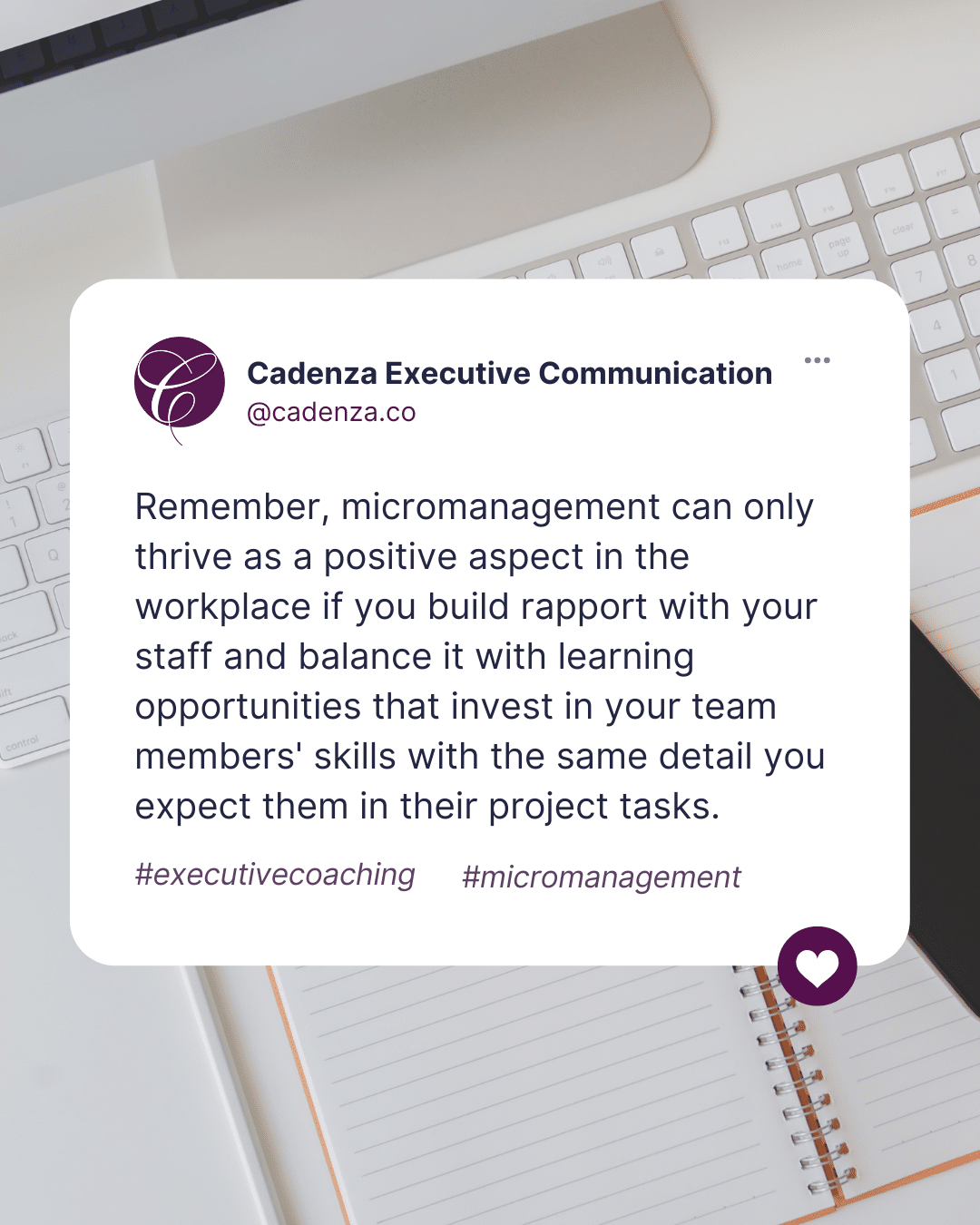Social Intelligence
Micromanaging Is Really Not That Bad

They say carrots are bad for you if you eat too many (you turn orange) but if you avoid them completely you won’t see in the dark. The same can be said for micromanaging! If you avoid it completely as a leader, your team will be in the dark.
If you’re setting your sites on a management position, we need to get clear on a big bad word- “micromanaging” It’s not all bad!
Hi, I’m Sarah, a communication consultant to executives and emerging leaders.
Today I want to debunk micromanagement and give you some communication tips that will help you strike the right balance in your leadership communication.
Micromanaging can be a good communication behaviour I'll show you how you can capitalize on it.
What is Micromanagement?
“The control of a business or project with excessive attention to minor details”- Collins Dictionary
Although it’s had so much negative press, micromanagement is not bad communication behaviour. On the contrary, it’s a necessary aspect you’ll need to build new skills and get good outcomes among your team. The thing that stops micromanagement from negatively impacting your employees is how you balance it with your soft skills.
Depending on your industry and tasks, you may need to increase the ratio of micromanagement.
For example, a surgeon training staff is not likely to ignore minor details, which could cause a fatality.
Likewise, a financial director needs to integrate clearly defined instructions to drive profit and sink loss. Precision in finance is crucial to growth.
Take a moment to think about your workflow and KPIs.
Then, consider what types of input you absolutely must give to your team that focuses on the nitty-gritty. Next, make a quick list of these elements. Now, check the list and strikethrough any tasks you can entrust to your team with a macro-management approach.
“An employee’s motivation is a direct result of the sum of interactions with his or her manager (Bob Nelson).”
Micromanagement is a necessary skill you’ll need to build new skills and get good outcomes among your team
This blog is best digested in 4 steps. First, we need to clarify micromanaging behaviour. Then, we’ll cover 5 tips to not overwhelm your team members and finally, we’ll wrap it up with a quick video tutorial, so stay tuned.
You might want to bookmark this page to refer back to later – because it could take more than one sitting!
Here are the steps for you to get a stronger grasp on ingredients your communication needs so that you can showcase your Assertiveness
- Watch ???? How Micromanagement affects employees (below)
- Review the 5 tips below
- Pick up a copy of the Communication Growth Plan for Work and review areas that you can expand to extend your professional speaking skills.
- If you like what you’ve learned, join the C-Suite Waitlist or reach out to me directly for executive coaching sessions or book me as a Speaker for your next event or team training.
Here are 5 tips:

1. Find the best communication style
For detailed tasks that you oversee, find a way to communicate the process to your team that best engages them (face-to-face meetings, project cards, calendar system). Select the method that requires the least effort for you (your time is short) but gives the most precise outline for your team.
2. Chunk large projects into phases
So your team doesn’t feel like they have a never-ending list of minute jobs to do. Instead, acknowledge the completion of core chunks and give targeted praise to the key players at the end of the project.
3. Give feedback
When employees are micromanaged, they can think you don’t trust them. They can also become fearful of your dissatisfaction. A helpful way to reduce fear is to make yourself available to provide clear and supportive feedback that emphasizes positive work. If you notice an error, use this as a training opportunity and dedicate some time to build up your team members’ skills for the gaps you see. The staff appreciates the time we managers give them to build up their skill set. This kind of interaction is time-consuming, but it is a gesture you’ll need to add to balance micromanagement with rapport building.
Ken Blanchard said,
For a manager to be perceived as a positive manager, they need a four to one positive to negative contact ratio.” You’ll need to amplify your soft skills if you’re a micro delegator.
Remember, micromanagement can only thrive as a positive aspect in the workplace if you build rapport with your staff and balance it with learning opportunities that invest in your team members’ skills with the same detail you expect of them in their project tasks.

4. Be very clear on allocating detailed tasks
If you’re allocating tasks to individual team members that you know are very detailed and focused, make sure they know they’re not the only ones working like this. Many employees will feel violated if faced with increased detail and attention from their manager when they believe their the only ones experiencing this kind of input and overseeing. On the other hand, if your workflow has the same level of detail, it doesn’t hurt to showcase at times where you can encourage mutuality. Employees don’t need to know everything you do, but they should have some scope and evidence to understand that you’re busier, working on other projects. If not, they may perceive you as the ivory tower leader. Of course, you should never justify your workflow to your staff (that could reduce your credibility, it’s not their business because it’s not their KPIs) but try to give some insight into your workflow demands from time to time; it will humanize you.
a. If you’re training a team member and have precise requirements, be direct.
You can say something like:
“There are lots of details, so I’ve built out this task list to give you a solid guide of the workflow. Of course, you’ll work through these things independently in the end, but we’re building up your skill, for now, so feel comfortable asking for questions and support where you need it from the team or me (and if you don’t have time, delegate this!).”
b. If you’re dealing with a long-term employee, make it clear through your communication that they are not the only ones with a detailed task list. Use a positive tone.
It could sound like this:
“The whole team is working on the fine details for this project. I’ve allocated all staff a detailed task list. It may feel overwhelming, but the benefit is, the detail will allow us to integrate all the outcomes as a team faster seamlessly.”
5. Reduce meetings
Too many meetings overwhelm your team from the University of Reading.
Ensure that your team has no meeting days- the best ratio is three meeting-free days per week, but have at least one day if you can.
This will automatically increase your staff members’ enhanced:
- Autonomy
- Communication
- Cooperation
- Engagement
- And drop their feeling of being micromanaged by anywhere between 33 – 63%
At this point in the pandemic, we know that most workers spend more than 85% of their time in meetings, and it is taking a psychological toll. This is toxic. Delete your meetings- as many of them as you can! And check your teams’ workflow to ensure they have at least one or at best three meeting-free days. This will help you strike a balance so that they are more attuned to the details they need because they’ll feel less overwhelmed.
Competent managers can delegate the details. The delegation of the smaller tasks is the only way to have the cognitive clarity to oversee global outcomes and meet your KPIs- which are your responsibilities.
Striking a balance between rapport building and managing is a fine art which is why not everyone makes it to CEO or executive roles.
If you’re struggling to communicate with your team confidently that gets the job done while balancing a healthy working relationship, you should check out C-Suite- a portfolio of science-backed communication training for executive and emerging leaders.
The C-Suite is my magnum opus. It provides a total fix for your career communication. You’ll learn actionable methods to increase your communication comfort, social intelligence, logical flow, body language, voice tone, and charisma to transform your speaking skills.
Does your delegation of tasks need work?
Everyone can improve their communication, even strong communicators.
Dealing with complex conversations, difficult colleagues, stressful meetings or important presentations doesn’t have to feel impossible.
If you’d like to get more tools for your career-based communication so that you can increase your leadership potential and interact with precision and impact, head to my Youtube channel dedicated to sharing tactics for your speaking skills.
If you need some inspiration or a PEP TALK for your speaking- check out this playlist.
Did you enjoy this post? Make sure to subscribe to our YouTube channel to get more content to increase your communication skills!
About the Author
Dr Sarah Lobegeiger de Rodriguez is a Keynote Speaker, Executive Speaking Coach, and Opera Singer who likes to play with words, sounds, and your impact.
Her academic background is in Music Performance, Communication Science and Speech & Language Pathology. She assists executive communication clients all over the world as a communication consultant with strong expertise in CEO, Founder and Entrepreneur communication strategies.
Connect with Sarah on LinkedIn.
© CADENZA
Level 14, 380 St Kilda Road, Melbourne, 3004
Privacy Policy
Terms & Conditions
Position Statement on Racism
